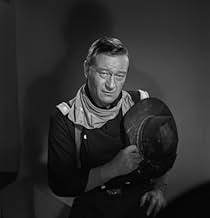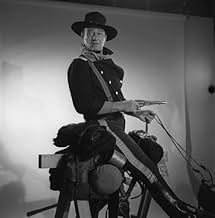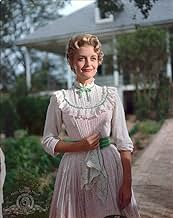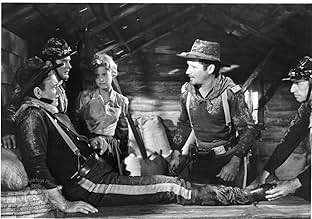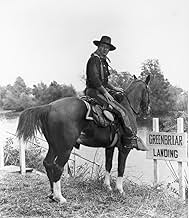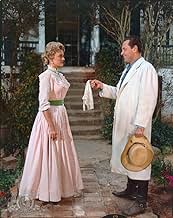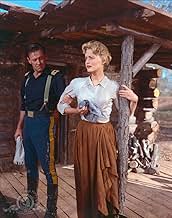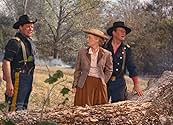IMDb RATING
7.1/10
13K
YOUR RATING
In 1863, a Union outfit is sent behind Confederate lines in Mississippi to destroy enemy railroads but a captive southern belle and the unit's doctor cause frictions within ranks.In 1863, a Union outfit is sent behind Confederate lines in Mississippi to destroy enemy railroads but a captive southern belle and the unit's doctor cause frictions within ranks.In 1863, a Union outfit is sent behind Confederate lines in Mississippi to destroy enemy railroads but a captive southern belle and the unit's doctor cause frictions within ranks.
- Director
- Writers
- Stars
- Awards
- 1 nomination total
- Director
- Writers
- All cast & crew
- Production, box office & more at IMDbPro
Featured reviews
John Ford probably did more to glorify the old American Cavalry of the 19th Century than any other major Hollywood Director. But while the Civil War is an element that keeps turning up in his movies, he never actually did do the Civil War film he wanted to do - a biography of the career of Ulysses Grant. In his career he tackled the Civil War three times.
In PRISONER OF SHARK ISLAND he dealt with the story of Dr.Samuel Mudd, who was sentenced to life imprisonment for involvement in Lincoln's Assassination. In HOW THE WEST WAS WON, Ford did the segment dealing with the battle of "SHILOH", with Harry Morgan as General Grant and John Wayne as General Sherman. This film was the nearest that Ford ever got to his dream film. THE HORSE SOLDIERS was the only film that was devoted to a full study of the effect of the war in the South, on both Union and Rebel soldiers. While not, perhaps, the best that Ford could have achieved - he was in the twilight of his master career - it is a fine film none-the-less.
The story is based on an incident in 1863 known as Grierson's Raid. Cavalry leader Benjamin Grierson was sent by Grant into Alabama and Mississippi on a raid to attack a railway junction, supposedly to destroy it for strategic reasons. While it was important to knock the railway junction out of effective work, the real purpose was to tie up Confederate forces in these backwaters. Since December 1862 Grant was struggling to capture the city of Vicksburg, Mississippi, the last major Confederate stronghold on the Mississippi River. But try as he did Grant kept losing to the Confederates under Joseph Johnston and John C. Pemberton (the commander in Vicksburg). But Grant had noticed how Confederate cavalry men like Earl Van Dorn and Nathan Bedford Forrest had forced him to use men to protect his supply lines, and took valuable time away from him trying to fight off or track them down. He decided that Grierson, a first rate Cavalry leader, could do the same thing to Johnston. A very intelligent Confederate Commander, Johnston was nervous at unexpected difficulties. Grant reasoned that Grierson's men would panic Johnston, and cause him to waste time chasing him down.
As it turned out Grierson's Raid worked. The pinning down of large numbers of Rebel troops in Alabama and Missisippi was wonderful for Grant's Vicksburg campaign. It was the beginning of the successful conclusion of the campaign, as Johnston's attention was now split between trying to help support Pemberton and trying to reassure frightened southern populations in the hinterlands. Grierson got most of his men back to Northern lines. Vicksburg was able to hold out until July 4, 1863. It's fall (the day after Lee's defeat at Gettysburg) really marked the beginning of the end of the Civil War.
This incident is the basis for THE HORSE SOLDIERS. Ford concentrates on what the experience of the war must have been like in the Southern countryside. Certain things are taken from other incidents and battlefields. When a military school's cadets are brought into the field to try to catch or slow down John Wayne's men, Ford is really picking up on an incident in the war in Virginia, when the young cadets at the Virginia Military Institute came out to fight the Union troops under Sheridan in 1864. One can forgive the transition of the incident.
It has been pointed out that one of the characters, Colonel Secord (Willis Bouchey) is a splendid type - the political officer. Men like Secord (usually in the position of General) bedeviled both sides, because of their usually normal level of mediocrity or idiocy. A few rose to the job well - the best of the Northern political generals was "Black Jack" Logan, who would be a valuable associate of Sherman in the battles around Atlanta. But for every positive General Logan, there were thieves like Benjamin "Spoons" Butler, who feathered his nest as military governor of New Orleans (he supposedly stole even the silver spoons of the citizenry). Actually Secord is normally intelligent, and follows Wayne's strategy. But he is constantly looking ahead at post-war elections. Towards the end he even wonders if the White House beckons.
Another lovely moment shows the fraying of the Southern cause. Wayne and his men come across two Rebel deserters (Strother Martin and Denver Pyle) who have tied up the local sheriff (Russell Simpson). Wayne thanks Martin and Pyle for their unofficial assistance to the Northern cause,telling them which way they plan to go. While Martin chatters away (mentioning the strength of Rebel forces in the area), Wayne carefully knocks out Pyle and then Martin, and then unties Simpson and assists in tying up the two deserters. William Holden is watching this, and later asks why he helped Simpson. Wayne explains that he decided to feed the deserters false information about his own movements, as they would probably give the information to the Confederates later on anyway.
All the performances are fine, with Wayne in particular as a man who hates doctors and medicine for a valid personal reason. Holden is in a subordinate role but he gets some nice moments. So does Constance Towers, in a rare leading part, as a passionate Confederate supporter who gradually gets to like Wayne. Carleton Young, as a former friend of Wayne, has a moment trying to rally Confederate forces at the railway depot.
It is a good Ford film, and makes one wish that Ford had made his Ulysses Grant biography.
In PRISONER OF SHARK ISLAND he dealt with the story of Dr.Samuel Mudd, who was sentenced to life imprisonment for involvement in Lincoln's Assassination. In HOW THE WEST WAS WON, Ford did the segment dealing with the battle of "SHILOH", with Harry Morgan as General Grant and John Wayne as General Sherman. This film was the nearest that Ford ever got to his dream film. THE HORSE SOLDIERS was the only film that was devoted to a full study of the effect of the war in the South, on both Union and Rebel soldiers. While not, perhaps, the best that Ford could have achieved - he was in the twilight of his master career - it is a fine film none-the-less.
The story is based on an incident in 1863 known as Grierson's Raid. Cavalry leader Benjamin Grierson was sent by Grant into Alabama and Mississippi on a raid to attack a railway junction, supposedly to destroy it for strategic reasons. While it was important to knock the railway junction out of effective work, the real purpose was to tie up Confederate forces in these backwaters. Since December 1862 Grant was struggling to capture the city of Vicksburg, Mississippi, the last major Confederate stronghold on the Mississippi River. But try as he did Grant kept losing to the Confederates under Joseph Johnston and John C. Pemberton (the commander in Vicksburg). But Grant had noticed how Confederate cavalry men like Earl Van Dorn and Nathan Bedford Forrest had forced him to use men to protect his supply lines, and took valuable time away from him trying to fight off or track them down. He decided that Grierson, a first rate Cavalry leader, could do the same thing to Johnston. A very intelligent Confederate Commander, Johnston was nervous at unexpected difficulties. Grant reasoned that Grierson's men would panic Johnston, and cause him to waste time chasing him down.
As it turned out Grierson's Raid worked. The pinning down of large numbers of Rebel troops in Alabama and Missisippi was wonderful for Grant's Vicksburg campaign. It was the beginning of the successful conclusion of the campaign, as Johnston's attention was now split between trying to help support Pemberton and trying to reassure frightened southern populations in the hinterlands. Grierson got most of his men back to Northern lines. Vicksburg was able to hold out until July 4, 1863. It's fall (the day after Lee's defeat at Gettysburg) really marked the beginning of the end of the Civil War.
This incident is the basis for THE HORSE SOLDIERS. Ford concentrates on what the experience of the war must have been like in the Southern countryside. Certain things are taken from other incidents and battlefields. When a military school's cadets are brought into the field to try to catch or slow down John Wayne's men, Ford is really picking up on an incident in the war in Virginia, when the young cadets at the Virginia Military Institute came out to fight the Union troops under Sheridan in 1864. One can forgive the transition of the incident.
It has been pointed out that one of the characters, Colonel Secord (Willis Bouchey) is a splendid type - the political officer. Men like Secord (usually in the position of General) bedeviled both sides, because of their usually normal level of mediocrity or idiocy. A few rose to the job well - the best of the Northern political generals was "Black Jack" Logan, who would be a valuable associate of Sherman in the battles around Atlanta. But for every positive General Logan, there were thieves like Benjamin "Spoons" Butler, who feathered his nest as military governor of New Orleans (he supposedly stole even the silver spoons of the citizenry). Actually Secord is normally intelligent, and follows Wayne's strategy. But he is constantly looking ahead at post-war elections. Towards the end he even wonders if the White House beckons.
Another lovely moment shows the fraying of the Southern cause. Wayne and his men come across two Rebel deserters (Strother Martin and Denver Pyle) who have tied up the local sheriff (Russell Simpson). Wayne thanks Martin and Pyle for their unofficial assistance to the Northern cause,telling them which way they plan to go. While Martin chatters away (mentioning the strength of Rebel forces in the area), Wayne carefully knocks out Pyle and then Martin, and then unties Simpson and assists in tying up the two deserters. William Holden is watching this, and later asks why he helped Simpson. Wayne explains that he decided to feed the deserters false information about his own movements, as they would probably give the information to the Confederates later on anyway.
All the performances are fine, with Wayne in particular as a man who hates doctors and medicine for a valid personal reason. Holden is in a subordinate role but he gets some nice moments. So does Constance Towers, in a rare leading part, as a passionate Confederate supporter who gradually gets to like Wayne. Carleton Young, as a former friend of Wayne, has a moment trying to rally Confederate forces at the railway depot.
It is a good Ford film, and makes one wish that Ford had made his Ulysses Grant biography.
John Wayne's been given a critical job to do by none other than General Ulysses S. Grant. He's been ordered to take 3 brigades deep into Confederate territory and destroy a critical rail supply station at a place called Newton's Station and then get his troops out the best way he can. He's ordered to take along, an army surgeon played by William Holden. Wayne's got what appears to be an unreasoning dislike of Holden and their rivalry professional and personal is what drives the plot of the Horse Soldiers.
John Ford always disparaged the films he made after Wings of Eagles, but in my opinion, The Horse Soldiers is one of his finest films. Also in my humble opinion he managed to get one of John Wayne's finest film performances. Wayne's a volunteer officer, in civilian life he rose from section hand on a railroad to an construction engineer. Holden calls him "section hand" as a term of derision after Wayne consistently refers to him as "croker."
Wayne and Holden were very close personal friends and friendly rivals at the box office. That's part of the reason that The Horse Soldiers is so good, the chemistry between them. In fact when Wayne died in 1979, Holden was said to have gone on one legendary drinking binge. Who would have suspected we'd have lost him as well two years later.
Holden as the doctor has a less flamboyant part than Wayne, but he makes the most of what he was given. I suspect knowing the relationship between Wayne and John Ford, he knew going in his part would be less, but he did it anyway.
Anyone who thinks John Wayne incapable of acting should see the scene in the saloon at Newton's Station after the Union forces repel a Confederate attack and are about their business destroying the railroad property. In a great drunk scene he reveals to Constance Towers the reason for his hatred of the medical profession. I won't reveal it, but it's something we can all understand. Wayne did this scene so well that Ford used an abbreviated version of it in The Man Who Shot Liberty Valance.
Ford makes marvelous use of music in there, weaving traditional Civil War era songs with the song written by Stan Jones for the film, I Left My Love. That is one catchy and infectious ballad, one of the best things written for a John Ford movie. Incidentally Stan Jones makes a brief appearance in the film as Ulysses S. Grant and does well by him.
There are two in the supporting cast that deserve mention. During the Civil War Lincoln had to deal with volunteer political generals, most of whom were a flop. Willis Bouchey playing John Wayne's co-commander in the expedition captures the phenomenon to perfection. He's argumentative, arrogant, and a general pain in the butt to Wayne. It's probably Bouchey's finest screen performance.
And Carleton Young also gives what I think is his finest screen performance as the one armed Confederate colonel who tries in vain to stop Wayne from completing his plans. It's a role that requires dignity and strength and Carleton Young is marvelous. In fact the contrast between Bouchey and Young as soldiers is pretty obvious.
The relationship between the Section Hand and The Croker evolves during the running time of The Horse Soldiers. It's a relationship well worth seeing develop.
John Ford always disparaged the films he made after Wings of Eagles, but in my opinion, The Horse Soldiers is one of his finest films. Also in my humble opinion he managed to get one of John Wayne's finest film performances. Wayne's a volunteer officer, in civilian life he rose from section hand on a railroad to an construction engineer. Holden calls him "section hand" as a term of derision after Wayne consistently refers to him as "croker."
Wayne and Holden were very close personal friends and friendly rivals at the box office. That's part of the reason that The Horse Soldiers is so good, the chemistry between them. In fact when Wayne died in 1979, Holden was said to have gone on one legendary drinking binge. Who would have suspected we'd have lost him as well two years later.
Holden as the doctor has a less flamboyant part than Wayne, but he makes the most of what he was given. I suspect knowing the relationship between Wayne and John Ford, he knew going in his part would be less, but he did it anyway.
Anyone who thinks John Wayne incapable of acting should see the scene in the saloon at Newton's Station after the Union forces repel a Confederate attack and are about their business destroying the railroad property. In a great drunk scene he reveals to Constance Towers the reason for his hatred of the medical profession. I won't reveal it, but it's something we can all understand. Wayne did this scene so well that Ford used an abbreviated version of it in The Man Who Shot Liberty Valance.
Ford makes marvelous use of music in there, weaving traditional Civil War era songs with the song written by Stan Jones for the film, I Left My Love. That is one catchy and infectious ballad, one of the best things written for a John Ford movie. Incidentally Stan Jones makes a brief appearance in the film as Ulysses S. Grant and does well by him.
There are two in the supporting cast that deserve mention. During the Civil War Lincoln had to deal with volunteer political generals, most of whom were a flop. Willis Bouchey playing John Wayne's co-commander in the expedition captures the phenomenon to perfection. He's argumentative, arrogant, and a general pain in the butt to Wayne. It's probably Bouchey's finest screen performance.
And Carleton Young also gives what I think is his finest screen performance as the one armed Confederate colonel who tries in vain to stop Wayne from completing his plans. It's a role that requires dignity and strength and Carleton Young is marvelous. In fact the contrast between Bouchey and Young as soldiers is pretty obvious.
The relationship between the Section Hand and The Croker evolves during the running time of The Horse Soldiers. It's a relationship well worth seeing develop.
The "...and I didn't kill either one of them..." speech is one of my favorite Wayne moments. Plainly past his conventionality, the Marlowe character gives breathtaking short shrift to the unending pettiness and fallibility he encounters; Kirby, Kendall, congressional wannabes, reb deserters et.al. It's an exemplar of the 'Duke' personna: dubious provenance, grand stature, indomitable purpose and a trace of sentiment. I'l put it with Searchers, Liberty', and Shootist (Wallace Beery impersonation in True Grit aside) as one of his best efforts.
Ford's battle scenes are as usual patriotically free of blood and require no reflection but the imagery is great (you want to join the cavalry) and the detail outstanding. We hear the clanking of canteens and cookpots, an argument over the placement of latrines and see the only filmic presentation of the making of Sherman Neckties (warped rails). The Ford family is well represented though we miss Harry Carey Jr (and Paul Fixx must have been tied up with the Rifleman).
If we had to have a love interest, Maureen Ohara could have at least tied this to "Rio Grande" and furthered the Ford library.
Normally wonderful Bill Holden has only brief bright moments and is mostly going through the motions and hung-over here. Neither Wayne nor Ford were slouches when it came to curling whiskey but by his own admission Holden aggravated all and threatened production with reckless, drunken extracurriculae, breaking an arm falling from a bridge.
This film was an inspiration in grade school and a guilty pleasure since.
Ford's battle scenes are as usual patriotically free of blood and require no reflection but the imagery is great (you want to join the cavalry) and the detail outstanding. We hear the clanking of canteens and cookpots, an argument over the placement of latrines and see the only filmic presentation of the making of Sherman Neckties (warped rails). The Ford family is well represented though we miss Harry Carey Jr (and Paul Fixx must have been tied up with the Rifleman).
If we had to have a love interest, Maureen Ohara could have at least tied this to "Rio Grande" and furthered the Ford library.
Normally wonderful Bill Holden has only brief bright moments and is mostly going through the motions and hung-over here. Neither Wayne nor Ford were slouches when it came to curling whiskey but by his own admission Holden aggravated all and threatened production with reckless, drunken extracurriculae, breaking an arm falling from a bridge.
This film was an inspiration in grade school and a guilty pleasure since.
As the Civil War goes against the North, General Grant (Stan Jones) is unable to take the Confederate fortress of Vicksburg because the Confederates have it so well defended... He realizes necessity of cutting off that city's supply sources..
Col. John Marlowe (John Wayne) is assigned to take a small brigade of cavalry from Tennessee, ride hundreds of miles into the Confederate territory and destroy the railroad at Newton Station, Mississippi, thereby cutting the supply line to Vicksburg... To do it, he will have to avoid all contact with rebel forces until he has reached his target...
The first problem Marlowe encounters is Major Hank Kendall (William Holden), an obstinate surgeon who will be accompanying the force... Marlowe has the expected contempt of the combat soldier for his colleague who carries no arms... In addition, when Kendall asserts his rights as an officer in the medical corps to declare unfit any soldier he considers so, Marlowe and Kendall clash...
The next problem is Marlowe's second in command, Col. Secord (Willis Bouchey), who makes no secret of his plans to use his military career to further his strong political ambitions...
The third problem is the high-spirited belle Hannah Hunter (Constance Towers). This violent Southern patriot gives him an initial hard time... The Yankee soldiers stay at her plantation soon after they cross into the Confederacy... When Hannah learns their plans, Marlow is forced then to take her along with them for security reasons...
Holden and Wayne (violently opposing strong personalities) perform their assignment with a consummate force, intensity, and expert teamwork... Constance Towers, too, registers a vital presence... At their first dinner, she passes Wayne a platter of chicken... As she leans over, threatening to divulge her engaging décolletage, she says: 'Oh come now, Colonel, a man with a great big frame like yours can't just nibble away like a little titmouse. Now what was your preference, the leg or the breast?'
Incorrigibly sentimental and romantic in his big cavalry epic, Ford's motion picture is full of heroic cavalry on the skyline imagery... Among the more affecting scenes is that in which a harsh compassionate Wayne comforts a dying young soldier and the one in which he registers his love for Towers... There is also a compelling sequence, pure John Ford, in which a group of teenage cadets march out from a Southern military academy to take on the enemy, which makes manifest to battle boys and pulls a retreat, leaving the kids cheering...
Col. John Marlowe (John Wayne) is assigned to take a small brigade of cavalry from Tennessee, ride hundreds of miles into the Confederate territory and destroy the railroad at Newton Station, Mississippi, thereby cutting the supply line to Vicksburg... To do it, he will have to avoid all contact with rebel forces until he has reached his target...
The first problem Marlowe encounters is Major Hank Kendall (William Holden), an obstinate surgeon who will be accompanying the force... Marlowe has the expected contempt of the combat soldier for his colleague who carries no arms... In addition, when Kendall asserts his rights as an officer in the medical corps to declare unfit any soldier he considers so, Marlowe and Kendall clash...
The next problem is Marlowe's second in command, Col. Secord (Willis Bouchey), who makes no secret of his plans to use his military career to further his strong political ambitions...
The third problem is the high-spirited belle Hannah Hunter (Constance Towers). This violent Southern patriot gives him an initial hard time... The Yankee soldiers stay at her plantation soon after they cross into the Confederacy... When Hannah learns their plans, Marlow is forced then to take her along with them for security reasons...
Holden and Wayne (violently opposing strong personalities) perform their assignment with a consummate force, intensity, and expert teamwork... Constance Towers, too, registers a vital presence... At their first dinner, she passes Wayne a platter of chicken... As she leans over, threatening to divulge her engaging décolletage, she says: 'Oh come now, Colonel, a man with a great big frame like yours can't just nibble away like a little titmouse. Now what was your preference, the leg or the breast?'
Incorrigibly sentimental and romantic in his big cavalry epic, Ford's motion picture is full of heroic cavalry on the skyline imagery... Among the more affecting scenes is that in which a harsh compassionate Wayne comforts a dying young soldier and the one in which he registers his love for Towers... There is also a compelling sequence, pure John Ford, in which a group of teenage cadets march out from a Southern military academy to take on the enemy, which makes manifest to battle boys and pulls a retreat, leaving the kids cheering...
A Civil War film where the history of the Civil War is all just jumbled together into a pastiche of life in the South while an unconvincing love affair bubbles up between a Union officer and Confederate woman, an oddly built feud between two Union officers breaks out, and the movie just kind of stops because an on set accident let to a death that sapped the director's enthusiasm for the project and he never filmed the ending, The Horse Soldiers is John Ford phoning the effort in. Talked into embracing sobriety by his doctor for his health, Ford seems to have been off his game here, never quite finding the right footing for the cavalry story.
It's the Western Theater of the war and General Grant is setting up his siege of Vicksburg. In order to help ensure his position, he orders Colonel John Marlowe (John Wayne) to head south towards Newton Station, Mississippi, the Confederacy's main train station for supplies to Vicksburg, to destroy any contraband as well as the railroad itself. The mission requires secrecy and guts, heading hundreds of miles into enemy territory, and Marlowe is the man to do it. Before he sets out, he's assigned a new officer, Major Henry Kendall (William Holden), a surgeon who refuses to carry a gun. There's antipathy between the two men from the moment Kendall shows up in camp, but Marlowe follows his orders and takes him along.
In Mississippi, the column soon comes across an isolated country home, Greenbriar, where Hanna Hunter (Constance Towers) and her servant slave Lukey (Althea Gibson) are waiting out the war. After some feigned hospitality, Kendall notes that Hunter is spying on Marlowe's officer meeting, hearing their plan to head straight through past Newton Station once it's sacked to Baton Rouge. Feeling like there's no choice, Marlowe decides to take Hanna and Lukey along so they won't give up the column's position, mission, or destination. So begins the ineffective romance between Marlow and Hanna that starts as a meet cute and never really moves past. She becomes slightly enamored of him because of his...well, it's not entirely clear why. He's a hard man, a dedicated Northerner, a man bred from a lower class (he's a train engineer without a formal education), but he does have a certain sense of honor that she finds attractive, I suppose, most notably when the column comes across a pair of Confederate deserters who have taken the local sheriff hostage. Marlowe gets some information from the deserters before knocking them out and handing them off to the sheriff with a tip of the hat.
There are two great moments in this film, and the first comes in Newton Station. They arrive in the little town with the people, mostly women, screaming at them to go home, and Marlowe figures out that the local Confederate colonel has set up a trap with an approaching train engine that's filled with Confederate troops. The battle that erupts is a slaughter and so poorly thought out from a military point of view that it's a wonder anyone thought it would be a good idea to include in the film (this isn't the great part, it's coming). Then the troops get to work on destroying the railroad, and it's just great to see the mechanics of what it means to tear up a railroad up to and including the creation of Sherman's neckties by wrapping the weakened iron railings around telegraph poles.
And then Wayne gives an impassioned speech about how much he hates doctors, and it's one of the oddest moments of the film. It feels like an idea made up on set rather than planned out. Marlowe hates doctors because some years ago two doctors convinced his wife that she had a tumor. They operated on her, they found nothing, and she died. To have this speech come up more than halfway through the film feels off, especially when this was the war where doctors were hacking off limbs with unclean equipment all the time. A speech about how doctors had lost him many good men during the fighting would have fit so much better. It would have applied to the situation at hand much more intimately, and operated as a direct challenge to Kendall who was in the same job. The use of a long-dead wife just feels random and off.
Anyway, the column moves on, and we get our second great moment of the film. Desperate for men (the scene ends up feeling like it should have taken place in late 1864 instead of early 1863, but whatever) a Confederate soldier shows up at the Jefferson Military School and begs for the headmaster to lead his students into battle against the Union cavalry that terrorized Newton Station. The old man, a reverend, organizing his boys of between 9 and 16 years old, into columns and leading them off to fight the dying cause (again...this fits better with a later in the war story, along with all the references to Andersonville that didn't open until 1864) while a widow begs him to let her have her only son left stay home is remarkably powerful. This could operate as a short film on its own, and it's great.
And then the students find the column, open fire, and Marlow refuses to fire on children while the movie ends up kind of treating the whole thing like a kind of joke.
The finale of the film is around a random bridge somewhere in Mississippi where Marlowe needs to fight off an approaching Confederate skirmishing force while another Confederate force comes upon them from another direction. It's not much of an action scene, doesn't seem to have much in terms of stakes, and doesn't really satisfy all that well. The actual ending of the film was apparently never shot because of the death of the stuntman during the filming of some action, and the movie simply stops with the Confederate column coming upon Kendall, who stayed behind to take care of the wounded.
This movie is kind of a mess, but there is some entertainment to be had. I find John Wayne watchable in just about anything he does, and since he's front and center for most of the film, he's an asset. Most of the looks at Confederate life carry a tinge of melancholy at their losing side that I appreciate. That bit with the boys leaving the military school is honestly outright beautiful in the anguish from the widowed mother. However, the story as a whole feels a bit random, the two major action sequences are lackluster, the romance simply doesn't work, and the professional rivalry between the two main male characters ends up feeling like something from a satire rather than a straight war picture.
I don't hate it, but this isn't exactly one of Ford's or Wayne's best efforts.
It's the Western Theater of the war and General Grant is setting up his siege of Vicksburg. In order to help ensure his position, he orders Colonel John Marlowe (John Wayne) to head south towards Newton Station, Mississippi, the Confederacy's main train station for supplies to Vicksburg, to destroy any contraband as well as the railroad itself. The mission requires secrecy and guts, heading hundreds of miles into enemy territory, and Marlowe is the man to do it. Before he sets out, he's assigned a new officer, Major Henry Kendall (William Holden), a surgeon who refuses to carry a gun. There's antipathy between the two men from the moment Kendall shows up in camp, but Marlowe follows his orders and takes him along.
In Mississippi, the column soon comes across an isolated country home, Greenbriar, where Hanna Hunter (Constance Towers) and her servant slave Lukey (Althea Gibson) are waiting out the war. After some feigned hospitality, Kendall notes that Hunter is spying on Marlowe's officer meeting, hearing their plan to head straight through past Newton Station once it's sacked to Baton Rouge. Feeling like there's no choice, Marlowe decides to take Hanna and Lukey along so they won't give up the column's position, mission, or destination. So begins the ineffective romance between Marlow and Hanna that starts as a meet cute and never really moves past. She becomes slightly enamored of him because of his...well, it's not entirely clear why. He's a hard man, a dedicated Northerner, a man bred from a lower class (he's a train engineer without a formal education), but he does have a certain sense of honor that she finds attractive, I suppose, most notably when the column comes across a pair of Confederate deserters who have taken the local sheriff hostage. Marlowe gets some information from the deserters before knocking them out and handing them off to the sheriff with a tip of the hat.
There are two great moments in this film, and the first comes in Newton Station. They arrive in the little town with the people, mostly women, screaming at them to go home, and Marlowe figures out that the local Confederate colonel has set up a trap with an approaching train engine that's filled with Confederate troops. The battle that erupts is a slaughter and so poorly thought out from a military point of view that it's a wonder anyone thought it would be a good idea to include in the film (this isn't the great part, it's coming). Then the troops get to work on destroying the railroad, and it's just great to see the mechanics of what it means to tear up a railroad up to and including the creation of Sherman's neckties by wrapping the weakened iron railings around telegraph poles.
And then Wayne gives an impassioned speech about how much he hates doctors, and it's one of the oddest moments of the film. It feels like an idea made up on set rather than planned out. Marlowe hates doctors because some years ago two doctors convinced his wife that she had a tumor. They operated on her, they found nothing, and she died. To have this speech come up more than halfway through the film feels off, especially when this was the war where doctors were hacking off limbs with unclean equipment all the time. A speech about how doctors had lost him many good men during the fighting would have fit so much better. It would have applied to the situation at hand much more intimately, and operated as a direct challenge to Kendall who was in the same job. The use of a long-dead wife just feels random and off.
Anyway, the column moves on, and we get our second great moment of the film. Desperate for men (the scene ends up feeling like it should have taken place in late 1864 instead of early 1863, but whatever) a Confederate soldier shows up at the Jefferson Military School and begs for the headmaster to lead his students into battle against the Union cavalry that terrorized Newton Station. The old man, a reverend, organizing his boys of between 9 and 16 years old, into columns and leading them off to fight the dying cause (again...this fits better with a later in the war story, along with all the references to Andersonville that didn't open until 1864) while a widow begs him to let her have her only son left stay home is remarkably powerful. This could operate as a short film on its own, and it's great.
And then the students find the column, open fire, and Marlow refuses to fire on children while the movie ends up kind of treating the whole thing like a kind of joke.
The finale of the film is around a random bridge somewhere in Mississippi where Marlowe needs to fight off an approaching Confederate skirmishing force while another Confederate force comes upon them from another direction. It's not much of an action scene, doesn't seem to have much in terms of stakes, and doesn't really satisfy all that well. The actual ending of the film was apparently never shot because of the death of the stuntman during the filming of some action, and the movie simply stops with the Confederate column coming upon Kendall, who stayed behind to take care of the wounded.
This movie is kind of a mess, but there is some entertainment to be had. I find John Wayne watchable in just about anything he does, and since he's front and center for most of the film, he's an asset. Most of the looks at Confederate life carry a tinge of melancholy at their losing side that I appreciate. That bit with the boys leaving the military school is honestly outright beautiful in the anguish from the widowed mother. However, the story as a whole feels a bit random, the two major action sequences are lackluster, the romance simply doesn't work, and the professional rivalry between the two main male characters ends up feeling like something from a satire rather than a straight war picture.
I don't hate it, but this isn't exactly one of Ford's or Wayne's best efforts.
Did you know
- TriviaThe film marked the beginning of mega-deals for Hollywood stars. John Wayne and William Holden received $775,000 each, plus 20% of the overall profits, an unheard-of sum for that time. The final contract involved six companies and numbered twice the pages of the movie's script. The film, however, was a financial failure, with no profits to be shared in the end.
- GoofsIn the shot right after Hank Worden throws the torch onto the cotton bales, look at the upper left of the screen. You will see an airplane flying from right to left.
- Quotes
Miss Hannah Hunter: [bending over with a plate of chicken, revealing ample cleavage] Do you prefer the leg... or the breast?
Col. John Marlowe: I've had quite enough of both, thank you.
- ConnectionsFeatured in Directed by John Ford (1971)
- SoundtracksI Left My Love
by Stan Jones
- How long is The Horse Soldiers?Powered by Alexa
Details
Box office
- Gross US & Canada
- $1,753,526
- Runtime
- 2h(120 min)
Contribute to this page
Suggest an edit or add missing content


